Related Research Articles

William Eldridge Odom was a United States Army lieutenant general who served as Director of the National Security Agency under President Ronald Reagan, which culminated a 31-year career in military intelligence, mainly specializing in matters relating to the Soviet Union. After his retirement from the military, he became a think tank policy expert and a university professor and became known for his outspoken criticism of the Iraq War and warrantless wiretapping of American citizens. He died of an apparent heart attack at his vacation home in Lincoln, Vermont.
The Rosenstiel School of Marine and Atmospheric Science is an academic and research institution for the study of oceanography and the atmospheric sciences within the University of Miami (UM). It is located on a 16 acre campus on Virginia Key in Miami, Florida. It is the only subtropical applied and basic marine and atmospheric research institute in the continental United States.
Sir Charles Maurice Yonge, CBE, FRS FRSE was an English marine zoologist.
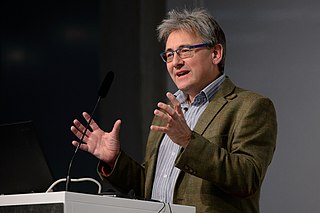
Professor Callum Michael Roberts is a British marine conservation biologist, oceanographer, science communicator, author and research scholar at the University of Exeter. He was formerly at the University of York. He is best known for his research and advocacy related to marine reserves and the environmental impact of fishing.
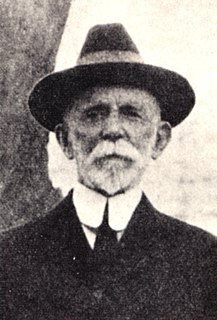
James Henry Emerton was an American arachnologist and illustrator.
Ariel A. Roth is a zoologist and creationist who was born in Geneva, Switzerland, and now lives in the United States. He is a leading figure in the field of flood geology, having been involved and published extensively on the creation–evolution controversy.
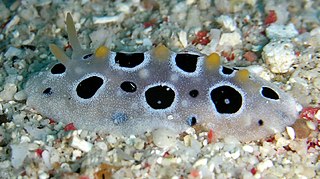
Phyllidia babai is a species of sea slug, a dorid nudibranch, a shell-less marine gastropod mollusk in the family Phyllidiidae.

Paul Bartsch was an American malacologist and carcinologist. He was named the last of those belonging to the "Descriptive Age of Malacology".

Klaus Rohde is a German biologist at the University of New England (UNE), Australia, known particularly for his work on marine parasitology, evolutionary ecology/zoogeography, and phylogeny/ultrastructure of lower invertebrates.
The clean-up crew is the term that has been used by many aquarists and vendors since the late 1980s to refer to various small animals commonly sold for use in keeping the reef aquarium clear of pest algae, detritus and parasites.
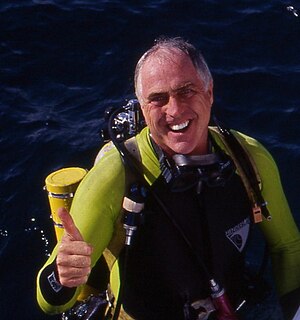
Bob Halstead, has made significant contributions to the sport of scuba diving in a multitude of capacities: photographer, author of eight diving books, early innovator in the development of dive tourism, pioneer in the dive liveaboard industry, diving instructor and educator, marine-life explorer and influential diving industry commentator. An ardent diver since 1968, Halstead has over 10,000 logged dives.
John West Wells was an American paleontologist, biologist and geologist who focused his research on corals.
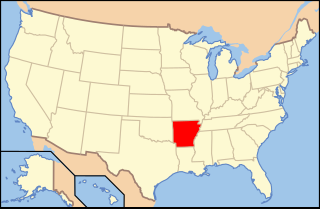
Paleontology in Arkansas refers to paleontological research occurring within or conducted by people from the U.S. state of Arkansas. The fossil record of Arkansas spans from the Ordovician to the Eocene. Nearly all of the state's fossils have come from ancient invertebrate life. During the early Paleozoic, much of Arkansas was covered by seawater. This sea would come to be home to creatures including Archimedes, brachiopods, and conodonts. This sea would begin its withdrawal during the Carboniferous, and by the Permian the entire state was dry land. Terrestrial conditions continued into the Triassic, but during the Jurassic, another sea encroached into the state's southern half. During the Cretaceous the state was still covered by seawater and home to marine invertebrates such as Belemnitella. On land the state was home to long necked sauropod dinosaurs, who left behind footprints and ostrich dinosaurs such as Arkansaurus.
Timothy R. McClanahan is a biologist and a senior conservation zoologist at the Wildlife Conservation Society (WCS) and is known for his work on the ecology of coral reefs. He lives and works in Mombasa, Kenya, where he studies the marine tropical ecosystems of the western Indian Ocean, and is the director of the WCS coral reefs program for eastern Africa.

Lindsay Boyd Collins was an Australian marine geologist and sedimentologist, a faculty member in the department of applied geology at Curtin University in Western Australia. He was interested in studying the continental shelf of Western Australia and coral reefs. Collins was a prominent scholar, he has completed projects on continental shelf mapping of Australian shelves, microbialites and seagrass banks at Shark Bay, and coral reef studies at the Abrolhos, Ningaloo, Scott Reef, the Rowley Shoals and the Kimberley.

Joseph Richard Pawlik is a marine biologist. He is the Frank Hawkins Kenan Distinguished Professor of Marine Biology in the Department of Biology and Marine Biology at the University of North Carolina Wilmington. He is best known for studies of sponges on Caribbean coral reefs that reveal ecological principles such as resource trade-offs, trophic cascades and indirect effects.
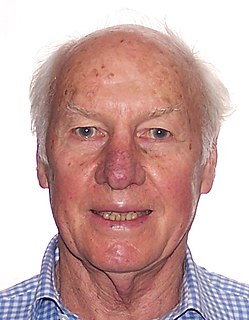
Anthony William Derek Larkum is a british plant scientist and academic based in Sydney. He is Professor Emeritus of Plant Sciences at the University of Sydney and Adjunct Professor at the University of Technology Sydney (UTS).
Robert Kent Trench is an American Biologist who was a Professor at the University of California, Santa Barbara. His research considered corals and symbiotic algae, with a focus on the adaption of zooxanthellae. He was awarded the 1994 International Society of Endocytobiology Miescher-Ishida Prize.
Vincent H. Resh is an American entomologist who primarily researches aquatic insects and medical entomology. He was the co-editor of the Annual Review of Entomology from 1991–1997.
References
- ↑ Steven J Long. Opisthobranch Newsletter. 25–26. S.J. Long.
- ↑ Shimek, Ronald (2008). "Who is Ron Shimek anyway..."
- ↑ Wings. 21–29. Xerces Society. 1998. p. 21. Retrieved 30 June 2015.
- ↑ Robbins, Doug (April 2005). "Media Review: Marine Invertebrates: 500+ Essential-To-Know Aquarium Species - A Pocket Expert Guide; Marine Bioluminescence: Secret Lights in the Sea".